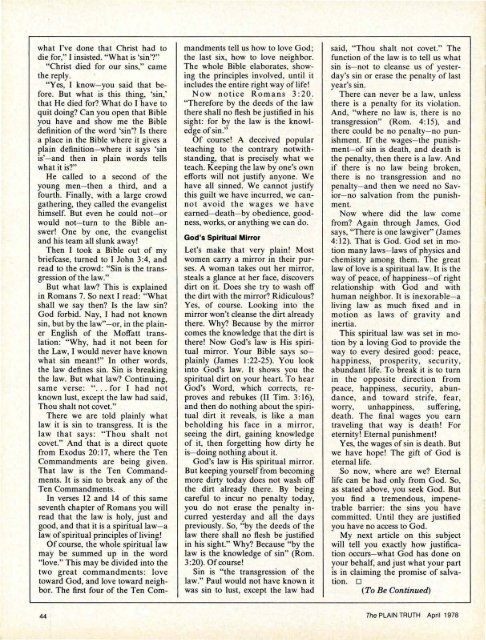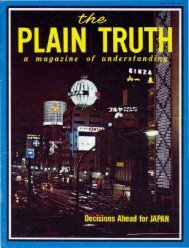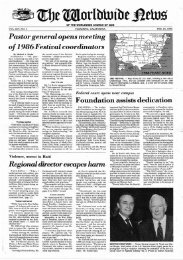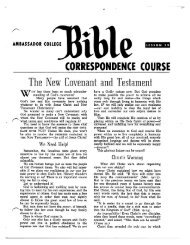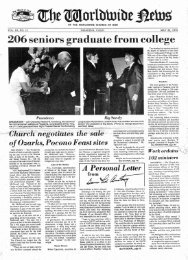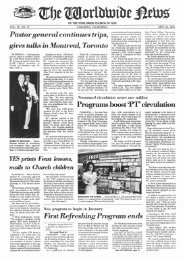Plain Truth 1978 (Prelim No 04) Apr - Herbert W. Armstrong
Plain Truth 1978 (Prelim No 04) Apr - Herbert W. Armstrong
Plain Truth 1978 (Prelim No 04) Apr - Herbert W. Armstrong
You also want an ePaper? Increase the reach of your titles
YUMPU automatically turns print PDFs into web optimized ePapers that Google loves.
what I've done that Christ had to<br />
diefor,' I insisted. "What is 'sin'?"<br />
"Christ died for our sins," came<br />
the reply.<br />
"Yes, I know-you said that before.<br />
But what is this thing, 'sin,'<br />
that He died for? What do I have to<br />
quit doing? Can you open that Bible<br />
you have and show me the Bible<br />
definition of the word 'sin'? Is there<br />
a place in the Bible where it gives a<br />
plain definition-where it says 'sin<br />
is'-and then in plain words tells<br />
what it is?"<br />
He called to a second of the<br />
young men-then a third, and a<br />
fourth . Finally, with a large crowd<br />
gathering, they called the evangelist<br />
himself. But even he could not-or<br />
would not-turn to the Bible answer!<br />
One by one, the evangelist<br />
and his team all slunk away! ,<br />
Then I took a Bible out of my<br />
briefcase, turned to I John 3:4, and<br />
read to the crowd: "Sin is the transgression<br />
ofthe law."<br />
But what law? This is explained<br />
in Romans 7. So next I read : "What<br />
shall we say' then? Is the law sin?<br />
God forbid. Nay, I had not known<br />
sin, but by the law"-or, in the plainer<br />
English of the Moffatt translation:<br />
"Why, had it not been for<br />
the Law, I would never have known<br />
what sin meant!" In other words,<br />
the law defines sin. Sin is breaking<br />
the law. But what law? Continuing,<br />
same verse: "... for I had not<br />
known lust, except the law had said,<br />
Thou shalt not covet."<br />
There we are told plainly what<br />
law it is sin to transgress . It is the<br />
law that says: "Thou shalt not<br />
covet." And that is a direct quote<br />
from Exodus 20:17, where the Ten<br />
Commandments are being given.<br />
That law is the Ten Commandments.<br />
It is sin to break any of the<br />
Ten Commandments.<br />
In verses 12 and 14 of this same<br />
seventh chapter of Romans you will<br />
read that the law is holy, just and<br />
good, and that it is a spiritual law-a<br />
law ofspiritual principles ofliving!<br />
Of course, the whole spiritual law<br />
may be summed up in the word<br />
"love ." This may be divided into the<br />
two great commandments: love<br />
toward God, and love toward neighbor.<br />
The first four of the Ten Com-<br />
44 '<br />
mandments tell us how to love God;<br />
the last six, how to love neighbor.<br />
The whole Bible elaborates, showing<br />
the principles involved , until it<br />
includes the entire right way oflife!<br />
N ow notice Romans 3: 20 .<br />
"Therefore by the deeds of the law<br />
there shall no flesh be justified in his<br />
sight: for by the law is the knowledge<br />
ofsin."<br />
Of course! A deceived popular<br />
teaching to the contrary notwithstanding,<br />
that is precisely what we<br />
teach. Keeping the law by one's own<br />
efforts will not justify anyone. We<br />
have all sinned. We cannot justify<br />
this guilt we have incurred, we cannot<br />
avoid the wages we have<br />
earned-death-by obedience, goodness,<br />
works, or anything we can do.<br />
God's Spiritual Mirror<br />
Let's make that very plain! Most<br />
women carry a mirror in their purses.<br />
A woman takes out her mirror,<br />
steals a glance at her face, discovers<br />
dirt on it. Does she try to wash off<br />
the dirt with the mirror? Ridiculous?<br />
Yes, of course. Looking into the<br />
mirror won't cleanse the dirt already<br />
there. Why? Because by the mirror<br />
comes the knowledge that the dirt is<br />
there! <strong>No</strong>w God's law is His spiritual<br />
mirror. Your Bible says soplainly<br />
(James I:22-25). You look<br />
into God's law. It shows you the<br />
spiritual dirt on your heart. To hear<br />
God's Word, which corrects, reproves<br />
and rebukes (II Tim. 3: 16),<br />
and then do nothing about the spiritual<br />
dirt it reveals, is like a man<br />
beholding his face in a mirror,<br />
seeing the dirt , gaining knowledge<br />
of it, then forgetting how dirty he<br />
is-doing nothing about it.<br />
God's law is His spiritual mirror.<br />
But keeping yourself from becoming<br />
more dirty today does not wash off<br />
the dirt already there. By being<br />
careful to incur no penalty today,<br />
you do not erase the penalty incurred<br />
yesterday and all the days<br />
previously. So, "by the deeds of the<br />
law there shall no flesh be justified<br />
in his sight." Why? Because "by the<br />
law is the knowledge of sin" (Rom.<br />
3:20). Ofcourse!<br />
Sin is "the transgression of the<br />
law." Paul would not have known it<br />
was sin to lust, except the law had<br />
said, "Thou shalt not covet." The<br />
function of the law is to tell us what<br />
sin is-not to cleanse us of yesterday's<br />
sin or erase the penalty of last<br />
year's sin.<br />
There can never be a law, unless<br />
there is a penalty for its violation.<br />
And, "where no law is, there is no<br />
transgression" (Rom. 4: 15), and<br />
there could be no penalty-no punishment.<br />
If the wages-the punishment-of<br />
sin is death, and death is<br />
the penalty, then there is a law. And<br />
if there is no law being broken,<br />
there is no transgression and no<br />
penalty-and then we need no Savior-no<br />
salvation from the punishment.<br />
<strong>No</strong>w where did the law come<br />
from? Again through James, God<br />
says, "There is one lawgiver" (James<br />
4: 12). That is God. God set in motion<br />
many laws-laws of physics and<br />
chemistry among them. The great<br />
law of love is a spiritual law. It is the<br />
way of peace, of happiness-of right<br />
relationship with God and with<br />
human neighbor. It is inexorable-a<br />
living law as much fixed and in<br />
motion as laws of gravity and<br />
inertia.<br />
This spiritual law was set in motion<br />
by a loving God to provide the<br />
way to every desired good: peace,<br />
happiness, prosperity, security,<br />
abundant life. To break it is to turn<br />
in the opposite direction from<br />
peace, happiness, security, abundance,<br />
and toward strife, fear,<br />
worry, unhappiness, suffering,<br />
death. The final wages you earn<br />
traveling that way is death! For<br />
eternity! Eternal punishment!<br />
Yes, the wages of sin is death. But<br />
we have hope! The gift of God is<br />
eternal life.<br />
So now, where are we? Eternal<br />
life can be had only from God. So,<br />
as stated above, you seek God. But<br />
you find a tremendous, impenetrable<br />
barrier: the sins you have<br />
committed. Until they are justified<br />
you have no access to God .<br />
My next article on this subject<br />
will tell you exactly how justification<br />
occurs-what God has done on<br />
your behalf, and just what your part<br />
is in claiming the promise of salvation.<br />
0<br />
(To Be Continued)<br />
The PLAIN TRUTH <strong>Apr</strong>il <strong>1978</strong>


